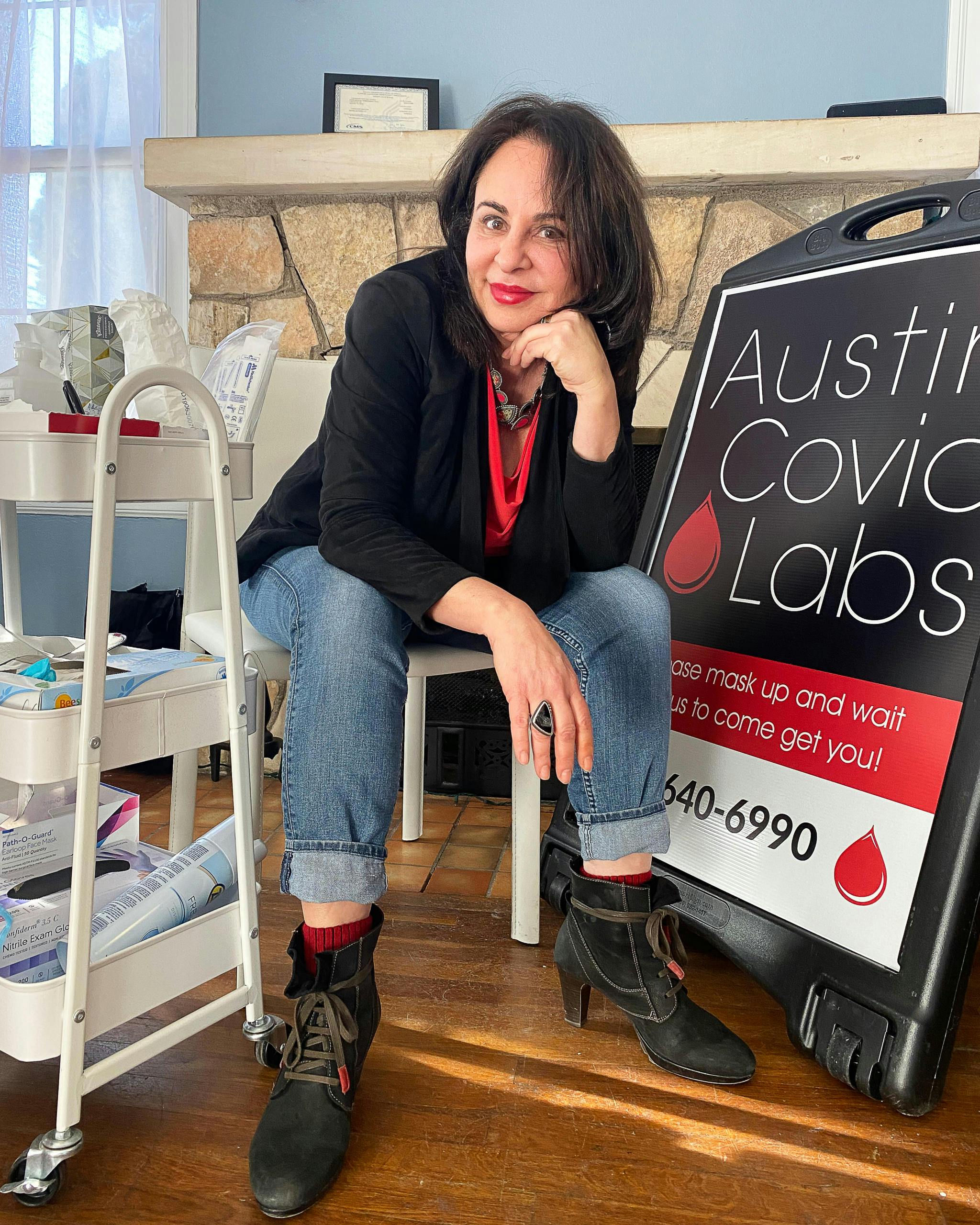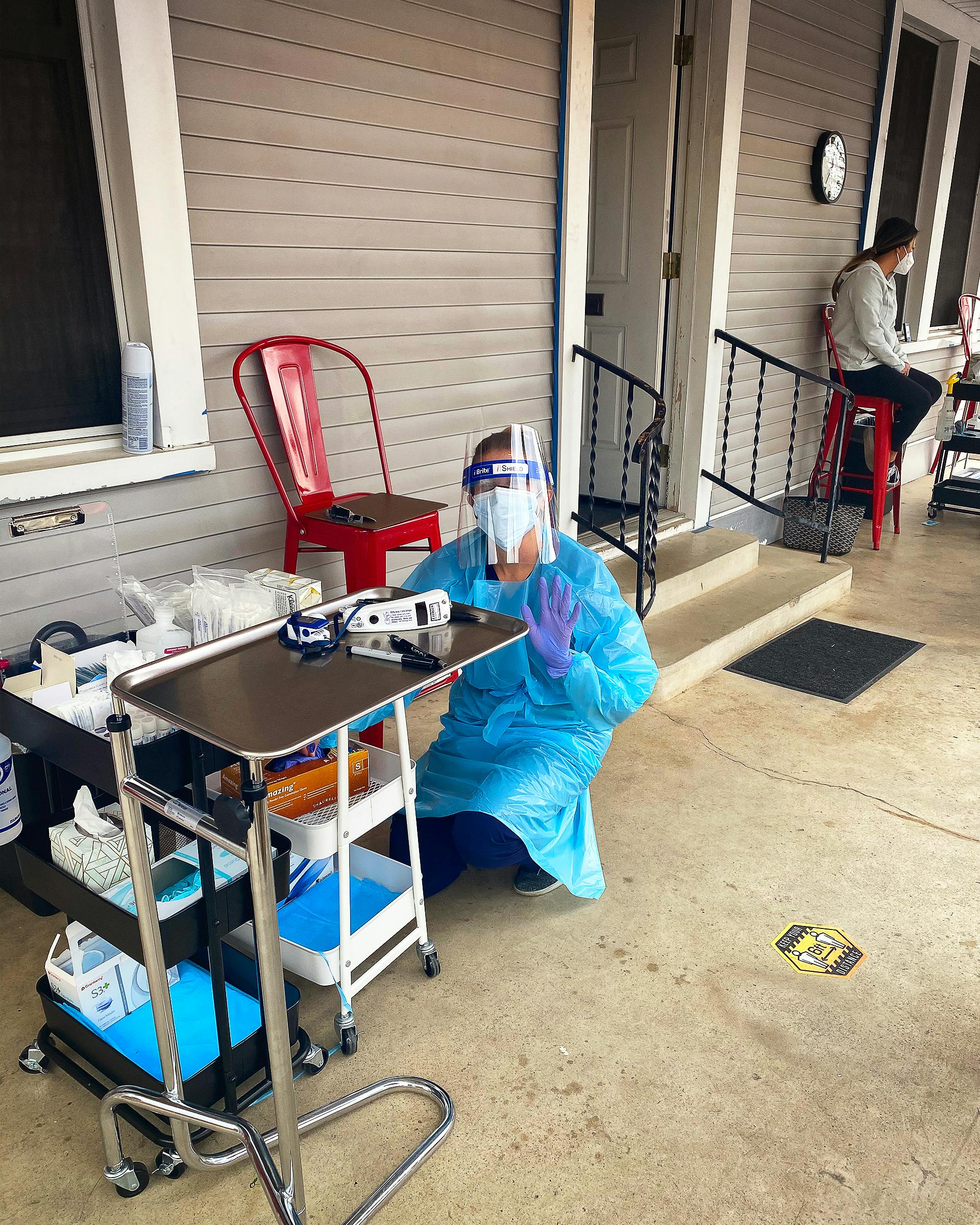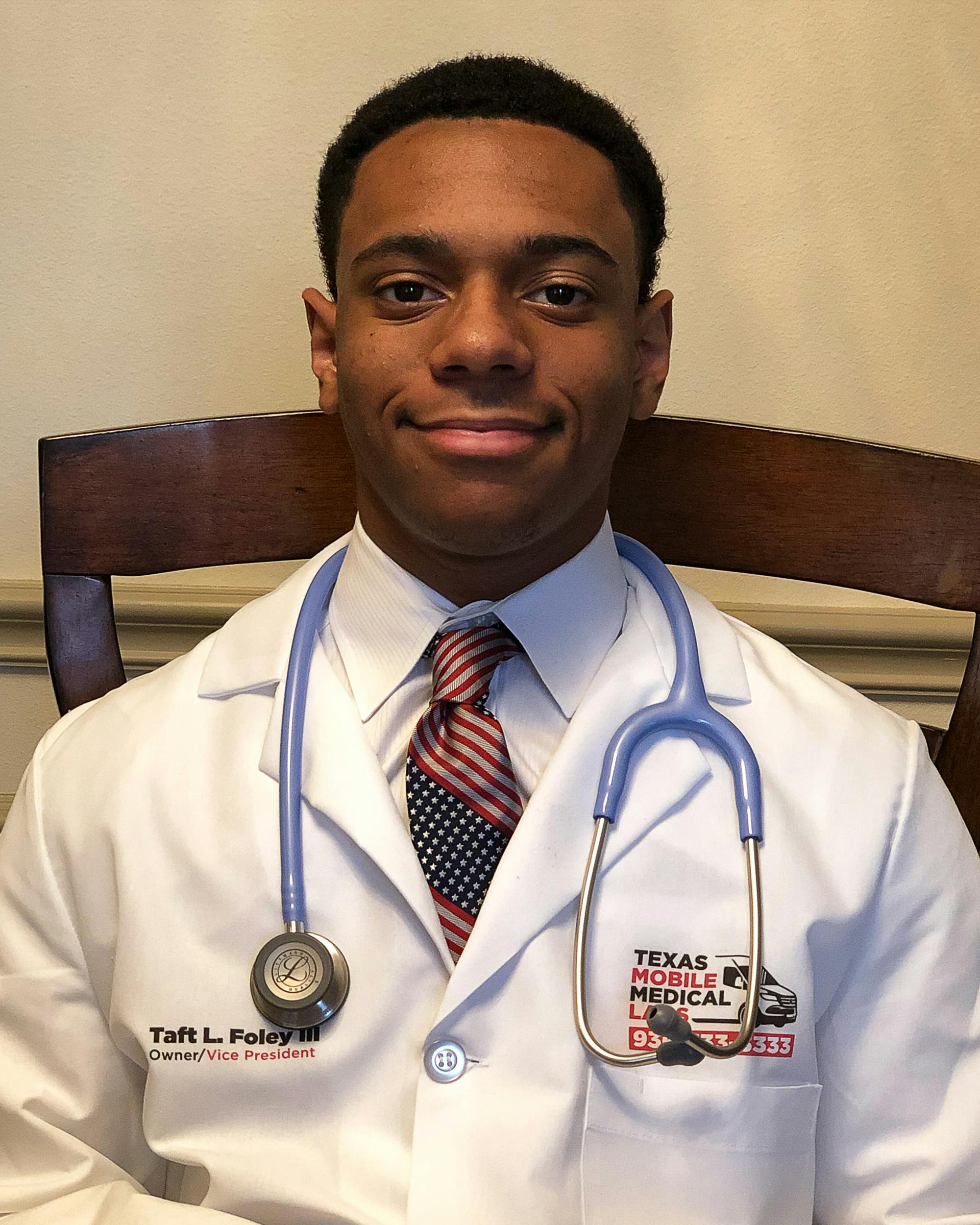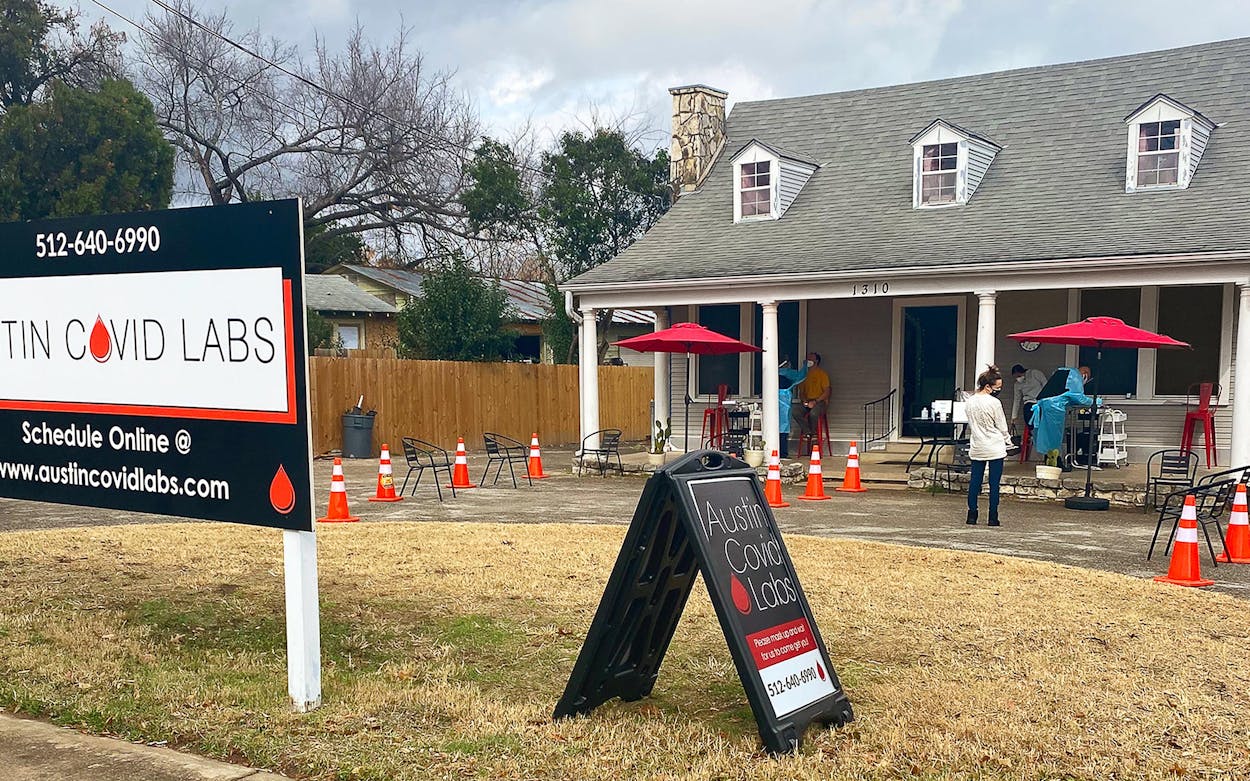Last March, Michelle Paris’s sixteen-year-old son came down with a fever, a cough, and a rash. The coronavirus had just begun reshaping American life, and Paris knew her boy was experiencing symptoms associated with COVID-19, but she couldn’t find anyplace to get him tested. Shortages of necessary supplies and lab capacity meant getting his nose swabbed was difficult, and the wait for results could stretch to more than a week. So Paris did what any concerned parent in her position might do: She spent more than sixty hours researching the differences between antibody, antigen, and PCR tests; called lab after lab in the state of Texas; and considered converting the outside area of the chiropractic clinic she owns in Austin’s Mueller development into an independent testing site.
In early April, Paris, an intense, no-nonsense Texan, cleared through mountains of paperwork and navigated a licensing process with both the Food and Drug Administration and the Centers for Disease Control to set up a testing facility. To ensure compliance with federal clinical lab guidelines, she hired nurse practitioners and physician’s assistants to oversee a staff trained to conduct COVID testing. By late April, she had Austin Covid Labs up and running at her chiropractic clinic, and by November had rented an old house on the city’s East Side from which to conduct testing full-time. Paris says there’ve been unexpected road bumps operating the facility—for one, it can take four months for CARES Act funding to reimburse her for testing uninsured visitors—but the process of setting up a testing site has otherwise been straightforward.
The lab now tests about two hundred Austinites a day—many who come from local businesses looking to screen their entire staffs to help control outbreaks that may include asymptomatic and pre-symptomatic carriers of the virus. Visitors to Paris’s site receive the results from “gold standard” PCR nasal-swab tests within 24 to 36 hours—a faster turnaround than at other facilities. To ensure speed, her operation works with labs that have the capacity to process COVID-19 tests but that aren’t being used by large-scale testing sites, owing to a lack of government coordination connecting those conducting tests with facilities that aren’t backlogged and can readily process them.

Research has shown that regular and speedy testing for the virus, conducted in sufficient numbers and combined with strict isolation for those whose results come back positive, could work in tandem with vaccines to bring an end to the pandemic. As we wait to achieve herd immunity, testing to catch asymptomatic and pre-symptomatic cases can be expanded quickly—at least theoretically. But, even as we approach a thirteenth month of the pandemic, the number of tests conducted in the U.S. has never come close to catching every COVID-19 case. Capacity in Texas has grown since the summer—more than 100,000 tests are conducted daily in the state now, compared with an average of closer to 60,000 around the virus’s first peak last July—but there’s still not enough widespread testing to catch the bulk of asymptomatic and pre-symptomatic cases.
That’s where operations such as Paris’s can help. While her facility is small, the Austinite isn’t the only Texan attempting to fill the testing gap. In Houston, an eighteen-year-old Eagle Scout and emergency medical technician, Taft Foley III, launched Texas Mobile Medical Labs to provide rapid antigen testing from a drive-up van, allowing businesses to test their staffs on-site. Foley, whose operation tests around eighty people a day, works between twenty and thirty hours a week while maintaining an AP course load as a high school senior. (“On days I come home too tired to study, I look at pictures of Elon Musk, Jay-Z, and Barack Obama on my desk, and they give me a second wind,” he says.) Scrappy start-ups such as his and Paris’s are small-scale versions of projects being carried out with more institutional funding and support: in San Antonio, Community Labs, a nonprofit, has built a facility specifically to process thousands of COVID-19 tests a day, with the intention of providing wide-scale testing for local schools to open safely.
“I love the idea of expanding capacity in these ways,” Texas A&M epidemiologist Rebecca Fischer said, “whether [with] large-scale screening programs or to maximize sample collection efficiency by finding these labs whose capacity we can leverage.”

When confronted with slow turnaround times and a lack of testing, Paris focused on leveraging unused lab capacity to deliver Austinites quicker results. Other Texans have focused on developing large-scale screening programs by rapidly expanding lab capacity itself.
In July, Rackspace cofounder and former chairman Graham Weston sat down for lunch in San Antonio with a pair of his fellow businessmen and philanthropists: Bruce Bugg, chairman of the Texas Transportation Commission and CEO of the holding company Southwest Bancshares, and Kronkosky Charitable Foundation managing director Tullos Wells. Weston had recovered from a fairly serious case of COVID-19 in the spring after he had close contact with an asymptomatic carrier. At the lunch, he suggested to his friends that they find a way to address the problem of Texans spreading the virus without knowing they have it. The group determined that speed was key: you needed to find silent spreaders and quarantine them before they could interact with many others.
Weston, Wells, and Bugg decided to put up capital to launch a nonprofit, Community Labs, that would build its own lab to dramatically scale up the testing capacity in San Antonio’s Bexar County. It could offer low-cost PCR testing to schools and businesses with a lightning-fast turnaround time of between ten and twenty hours. The three partners contributed $2.5 million through their charitable foundations to buy the equipment, hire staff, and contract with a private organization, BioBridge, to run the lab.
The trick to achieving faster results, according to Community Labs president Sal Webber, is in the setup. Building a bespoke lab allowed the operation to optimize for conducting PCR tests for COVID-19, while preexisting labs tend to be arranged in a way that makes sense for conducting a wide variety of medical tests. “There’s nothing that we’ve really innovated on yet,” Webber said. “We’ve just been very conscious of the placement of the materials in the lab, how far people are reaching, and making sure they’re not walking too far. It’s just a really steady, regimented process to work through each sample.”

Having an even slightly more efficient process means that Community Labs is currently testing more than 10,000 samples a day—“a lot,” according to A&M’s Fischer—with results back in no longer than one business day. Webber said the lab is capable of doing even more—as many as 16,000 tests—while maintaining its current processing speed. The organization, which has contracts with eleven school districts, five universities, and a dozen local businesses, has conducted more than 300,000 tests through the first week of February.
What Community Labs found was instructive. In its tests for businesses, school districts, and colleges and universities, the positivity rate has been less than 1.5 percent. The tests the company has conducted of the general public in partnership with San Antonio Metropolitan Health, however, have come back positive nearly 12 percent of the time. The findings underline the fact that the Texans most likely to seek out testing outside of a universal screening effort are those who believe they have been exposed or those who feel sick—and that by not doing more widespread testing of the general public, the state is missing a significant number of cases.
Bugg said his organization has already met with groups in Ohio, Phoenix, and other parts of the country to replicate the model, and is developing “lab in a box” materials that others can use to replicate its business model. In early January, Community Labs announced a contract with the State of Texas to provide as many as 10,000 daily tests for first responders in Laredo and El Paso.
Community Labs’ leaders are optimistic that we’re on the back end of the current pandemic, but Bugg said building a lab, learning how to direct resources to the right place, and maintaining the capacity to test for other disease outbreaks will better equip Texas for future pandemics. To explain why Community Labs will stick around even after COVID-19 is behind us, Webber related an analogy he’d heard from Weston. “You don’t need a battleship every single day, but you still need to have one in the harbor,” he said. “Because the day that you need it, you can’t just start building it.”
That echoes what others have argued, including Bill Gates and Daniel Wrapp, the award-winning microbiologist at the University of Texas whose work over the past four years led to the rapid development of the vaccine and treatments that received FDA approval. The more that’s invested in preparedness and basic research as a year-round proposition, the more likely we are to be able to handle the next crisis we encounter.
“It’s not as though these labs are only going to be valuable during the time of COVID-19: a platform that you use for PCR testing for a SARS-CoV-2 virus is going to be largely the same that you use for many disease agents,” Fischer said. “Maybe now there will be labs that can test for all of these things that we’ve been crying for capacity to test for.”
- More About:
- Health
- Pandemic
- San Antonio








